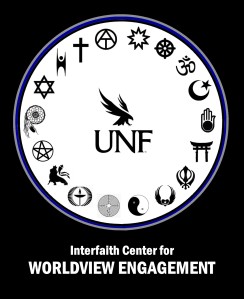by Adah Shair, Interfaith Center Student Assistant, Muslim Student Association Treasurer
The event was held on the 19th of September in the Interfaith Center/Women’s Center Tri-lounge. The speaker was Emily Schroder, a student intern at the Interfaith Center and the Vice President of “Better Together” on campus. I still remember during my first staff meeting at the interfaith center, Emily’s assertion as a Macrocosmic Panentheist brought to mind random images of economics and astrophysics. I didn’t understand nor can explain the basis of these random ideas as my first reaction to the term. But being given a chance to hear Emily speak about her beliefs was a perfect way to transform that ignorant part of my being. The event began with the Interfaith Center routine of laying down the “Safe Space Guidelines” to foster an environment of mutual respect and understanding. Interfaith Center workers, volunteers and even students who are regular attendees of our events chimed in to elaborate on the rules using examples. Emily started off by broadly defining her faith as believing “God is in everything and everything is in God. Yet, God is bigger than everything.” As alien as the term Macrocosmic Panentheist sounded before, by putting it into these simple words, Emily made it surprisingly easy for me to relate to her belief. What surprised me the most was how I joined the conversation with the intent of learning more about Emily’s faith and ended up discovering parts of my own faith that were unclear before.
I have always preferred concrete concepts over abstract ideas: mathematics over philosophy. Emily’s example of picturing God as a spiral fractal immediately grabbed those vague floating ideas in my head and set them in a perfect fit in an image of a fractal. In mathematics, fractal is defined as a set of self-repeating patterns. An example of a spiral fractal in nature is the Romanesque broccoli See image above). Emily beautifully explained her belief that we are a part of God’s spiral and as we emerge in that reality we cultivate our own spirals as humans. This theme closely resonates with my Islamic belief that God created humans in His image. It was amusing how being on the extreme ends of the spectrum, a Macrocosmic Panentheist would believe something a Muslim believes. I think understanding, that despite the apparent differences, we believe in our potential as humans to reach a higher consciousness is a leap towards a culture of interfaith.
I have always been drawn to books, movies and ideas that are unsettling and disturbing, because they make me question my ways and beliefs. I found a similar unsettling quality in this conversation with Emily. Emily’s spiritual journey since a very young age, battling and questioning ideologies and looking for answers stood as a stark comparison to the quiet acceptance of my belief as a Muslim. It challenged me to learn more about my faith, to believe with conviction, not with compulsion.
Once the floor was opened for Q/A, the audience was brimming with curiosity and eagerly waited for their chance to ask questions. On being asked what did she think happens after death, Emily simply stated that she was not very concerned about that. She would rather put her energy in the present, in building a positive macrocosmic effect and in breaking down conflicts through experiencing other’s stories. This honesty and genuineness is what I found to be the most beautiful elements of this conversation. And I think it was this quality of genuineness mixed with Emily’s warm and welcoming spirit that made students stay and converse with her, well after the event was officially over.

